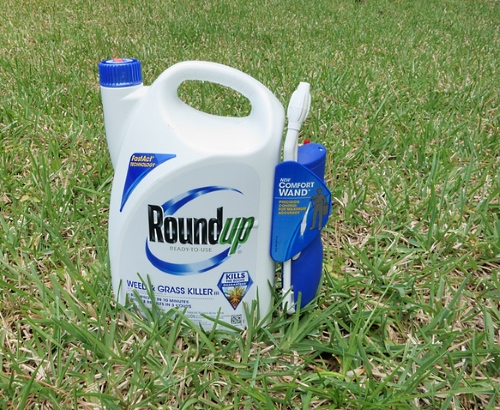The Latest News:
Over 11,200 lawsuits have been filed against Monsanto’s RoundUp weed killer
March 27th, 2019 – St. Louis Post – Dispatch: Jury Penalizes Bayer / Monsanto in $80 million cancer case.
Feb 14, 2019 – Fox News and CNN report: 41% Increase in Cancer Study Finds
Jan 28, 2019 – St. Louis Post – Dispatch: Federal Judge Allows Evidence into RoundUp Trials
Legal Verdicts:
March 27th, 2019
Jury returns a $80,000,000 verdict on behalf of Edwin Hardeman, 70, who used RoundUp on his Bay Area property.August 10, 2018
Jury returns a $289,200,000 verdict on behalf of Dewayne “Lee” Johnson, a groundskeeper for the Benicia Unified School DIstrict who was diagnosed with non-Hodgkin’s lymphoma after years of using RoundUp pesticides.
Roundup Lawsuit Lawyers
Whether you have used Roundup weed killer on your own yard, seen the container on a shelf in a store or have a friend who swears by its results, chances are you have heard of the popular product.
However, if you have been feeling ill and may believe it could be linked to RoundUp use, you may wish to seek the advice of lawyer familiar with the RoundUp litigation. This webpage includes facts, the latest news, studies, and other details about RoundUp and the over 11,200 pending lawsuits, several hundred of which are being handled by our law firm.
While less than a year ago you may have not been aware of the dangers associated with RoundUp, the weed killer has now been associated with non-Hodgkin’s lymphoma (NHL), and constant media attention.
According to the International Agency for the Research on Cancer, the main ingredient in Roundup, known as glyphosate, has been declared a “probable human carcinogen.” In 2019, more studies have revealed that RoundUp may be linked to an over 40% increase in cancer, specifically non-Hodgkins lymphoma.
To learn more about this type of cancer, we recommend visiting the Mayo Clinic website and scheduling an appointment with your doctor if symptoms exist.
Have You Worked Around Roundup?
Have you routinely used Roundup and noticed a significant decline in your health? If you or someone you know has suffered adverse health complications from this weed killer, our thoughts and sincere condolences go out to you.
Unfortunately, we have worked with hundreds of others who have also been negatively affected by a dangerous and toxic product. We know how challenging this time can be for you and your family. Below we have created extensive information and background on RoundUp to help you gain a better understanding of RoundUps dangers as well as legal options.
 Let The Oshman Firm Help
Let The Oshman Firm Help
As you read below, if there is a question not answered and you are ready to speak with our legal team who can provide you accurate information, contact the attorneys at The Oshman Firm today at (800) 400-8182 for a no-cost, no-obligation consultation. We will be your advocates, fight for your rights and help you stand up against the makers of this toxic product.
– Ted Oshman, Managing Partner
Facts about Roundup
 What is Roundup?
What is Roundup?
Originally introduced in 1974 by Monsanto, Roundup is one of the world’s most commonly used herbicides. Roundup contains glyphosate, which has been declared a “probable human carcinogen” from the International Agency for the Research on Cancer.
Monsanto’s glyphosate products are available in more than 130 countries and have been approved for weed control in over 100 crops. The herbicide is generally used to control weeds in different areas, such as roadsides, along railways and around residential homes (such as sidewalks or gardens).
What is glyphosate?
A phosphonate used to kill weeds and grasses that interfere with crops, glyphosate was originally discovered to be an herbicide by John E. Franz, a Monsanto chemist, in 1970.
By 2016, glyphosate-based herbicides saw a 100-fold increase in frequency, compared to when it first became available in the 70s. And though glyphosate and glyphosate-based herbicides (such as Roundup) have been approved and regulated, their negative effects on both humans and the environment remain an issue.
The IARC’s Report on Roundup
It was in March 2015 that the International Agency for Research on Cancer reported that exposure to Roundup can lead to cancer, despite Monsanto previously marketing its product as “environmentally friendly” and “biodegradable.”
Monsanto’s Chief Technology Officer, Dr. Robb Fraley, addressed the charge: “We are outraged with this assessment.”
This classification from the IARC is the result of multiple studies conducted since 2001 on the dangers of glyphosate for agricultural workers. Evidence shows the rate of workers with non-Hodgkin lymphoma was higher in those exposed to the herbicide versus those who were not.
Unfortunately, non-Hodgkin lymphoma is not the only known risk associated with Roundup.
Risks of Roundup Exposure
 Roundup weed killer has been linked to numerous diseases and illnesses, including:
Roundup weed killer has been linked to numerous diseases and illnesses, including:
- Autism
- ADHD
- Birth Defects
- Celiac Disease
- Chronic Kidney Disease
- Irritable Bowel Syndrome
- Reproductive Problem
- Hypothyroidism
- Heart Disease
- Liver Disease
- Depression
- Colitis
- Cancer
Roundup has been linked to several types of cancer, including:
- Brain
- Breast
- Prostate
- Lung
- Blood
If you or someone you know has worked directly with the weed killer or been exposed to it, the herbicide could be responsible for your ailments or cancer diagnosis.
Roundup Exposure

Roundup pesticide exposure can come in different forms, from at-home use in your yard or garden to ingesting the product through plants in your diet.
Farmers
Farmers and field workers are at an exceptionally high risk for suffering side effects because of the frequency and quantity with which the weed killer is used. Even farmers of smaller crops have reported using as much as 50-70 gallons of Roundup a year.
Children
According to scientists from the Agency for Toxic Substances and Disease Registry, a branch of the US Department of Health and Human Services, a US Atlantic Coast Childhood Brain Cancer Study revealed that a child’s chances of developing brain cancer doubled when they had at least one parent previously exposed to Roundup during the two years before birth.
Groundskeepers & Golf Course Personnel
We have seen a high incident rate among groundskeepers and those who handle RoundUp as part of their daily jobs. In the most recent trial against Monsanto, Dewayne “Lee” Johnson, a Northern Californian groundskeeper and pest-control manager, was 42 when he developed a strange rash that would lead to a diagnosis of non-Hodgkin’s lymphoma in August 2014. His groundskeeper duties included mixing and spraying hundreds of gallons of Roundup, the company’s glyphosate-containing weedkiller product, as indicated by court records.
Additional Studies into Roundup
Further studies have evaluated how Roundup can affect DNA, cells and tissue culture. For example, experiments have shown that in various animal models (i.e. fruit fly larvae, mice, blood cells of European eel), the exposure of Roundup had damaging effects on DNA.
During the process of cell division, each daughter cell must receive an identical copy of DNA from its parent cell. Otherwise, the daughter cell can receive damaged DNA, which can turn into cancer.
A 2004 study conducted by the National Scientific Research Center and the University of Pierre and Marie Curie in France revealed that Roundup caused substantial errors in the cell division of sea urchin embryos. Regarding this conclusion, scientists made a direct connection between the errors and cancer, and released a warning stating that the cumulative amount of Roundup needed to cause the errors was 500 to 4,000 times lower than what humans would be exposed to in an aerial spraying of the weed killer.
According to Dr. Fernando Manas, a biologist at the National University of Rio Cuarto in Argentina, the spraying of glyphosate is what is causing the DNA damage. His research revealed that pesticide sprayers in the soy industry had more DNA damage in their lymphocytes than those who had not been exposed to pesticides, with Roundup named as one of the most commonly used herbicide.
The Pontifical Catholic University in Quito, Ecuador studied those living in northern Ecuador for evidence of DNA damage after the area was sprayed with Roundup to remove illicit crops. Those who had been exposed to the herbicide developed various adverse health problems, including abdominal pain, vomiting, fever, heart palpitations, blurred vision, insomnia, numbness and headaches, and DNA damage.
As early as 1998, scientists have known that when normal human lymphocytes are exposed to Roundup in a test tube, the DNA is likely to be damaged.
Meanwhile, herbicides continue to accumulate in our water, land and food.
The Roundup Lawsuit
Allegations raised against Monsanto’s Roundup include:
- Failure to properly research the possible link between the weed killer and cancer
- Failure to warn about potential risks associated with exposure to the weed killer
- Disregarding the probable risks of the weed killer
- Disregarding the safety warning of the weed killer
In more inspiring news, in March 2017, the California Environmental Protection Agency became the first U.S. agency to declare glyphosate as a “known human carcinogen” under the state’s Proposition 65.
Controversy Around The Popular Weedkiller
Further issues and controversies have risen in connection with Roundup’s link to cancer, such as:
- The United Nation’s Food and Agriculture Organization and WHO are backed and funded by pesticide manufacturers and thus reportedly impartial
- California Judge Vince Chabria released email correspondence between Monsanto and federal regulators that confirmed portions of research into the toxicity of glyphosate were ghostwritten by paid company employees, only using the names of academics to establish credibility
- A senior official from the Environmental Protection Agency is accused of helping Monsanto thwart cancer studies
- A WebMD director is revealed to be reportedly have been paid by the pesticide manufacturer to promote positive PR for the company
If You’ve Worked With Roundup Before
If you or someone you know has been exposed to Roundup, it is recommended you seek medical attention to better assess your health. Early detection of potential negative effects can help conditions be dealt with accordingly and immediately.
Or, if an illness or disease has already been diagnosed, contact a Roundup lawsuit attorney today. Though a monetary settlement cannot undo the pain, suffering or physical damage the product has caused, compensation could assist with medical bills, treatment or missed wages. The manufacturers of Roundup should be held responsible for their carelessness and negligence, and we are here to stand up for your rights.
Help is Available – Contact a Roundup Lawsuit Attorney Today
If you endured illnesses or injuries following the use of Roundup, you are not to blame – the manufacturer of the product should be held liable to the fullest extent of the law. As well, farmers should not be held liable for crops tainted by the weed killer, when the corporation selling it was blatantly aware of its risks.
The attorneys at The Oshman Firm have decades of combined legal experience helping those who have been hurt from toxic, defective and dangerous products such as Roundup weed killer.
We fight for our clients, take care of them and ensure they receive the assistance they need and deserve to improve their quality of life.

“I was in pain and times were hard. Ted helped me understand some of the complex sciences, how the laws were working and assured me I wasn’t the only one suffering (from a company’s defective product). He resolved my case and kept me informed along the way. It is nice to be comfortable and enjoying life again. All my family can say is, “Thank you!” – Julie H.
We can be your advocates, too. Contact us today by calling (800) 400-8182 for a no-cost, no-obligation consultation.
We care about you and your health – let us help you move on with your life.
Back to top

